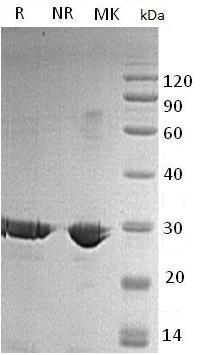-
Product Name
Human TPI1/TPI (His tag) recombinant protein
- Documents
-
Description
Triose-phosphate isomerase, also named Triose-phosphate isomerase, TPI and TIM, is an enzyme that catalyzes the reversible interconversion of the triose phosphate isomers dihydroxyacetone phosphate and D-glyceraldehyde 3-phosphate. TPI has been found in nearly every organism searched for the enzyme, including animals such as mammals and insects as well as in fungi, plants, and bacteria. However, some bacteria that do not perform glycolysis, like ureaplasmas, lack TPI. TPI plays an important role in glycolysis and is essential for efficient energy production. TPI deficiency is an autosomal recessive disorder and the most severe clinical disorder of glycolysis. Triose phosphate isomerase deficiency is associated with neonatal jaundice, chronic hemolytic anemia, progressive neuromuscular dysfunction, cardiomyopathy and increased susceptibility to infection and characterized by chronic hemolytic anemia.
-
Protein name
triosephosphate isomerase 1(TPI1)
-
Protein short names
TPI
-
Uniprot ID
P60174
-
Source/Expression Host
E. coli
-
Expression Plasmid/cDNA
A DNA sequence encoding the Human TPI1/TPI Met1-Gln249 is expressed with a 6His tag at the N-terminus.
-
Protein Species
Human
-
Purity
>95% as determined by SDS-PAGE.
-
Validations

Human TPI1/TPI (His tag) recombinant protein
Related Products / Services
Please note: All products are "FOR RESEARCH USE ONLY AND ARE NOT INTENDED FOR DIAGNOSTIC OR THERAPEUTIC USE"
